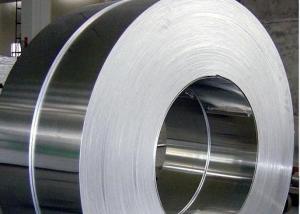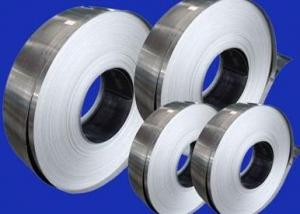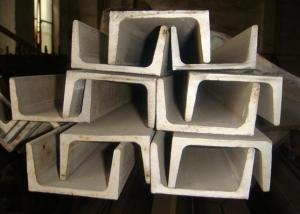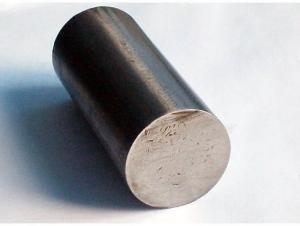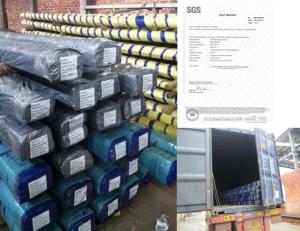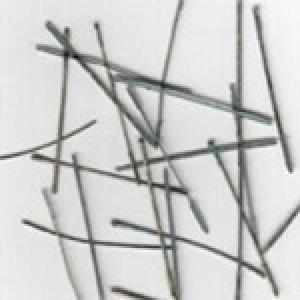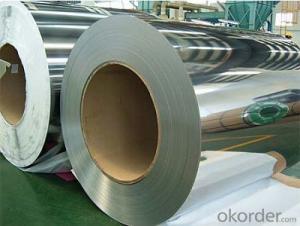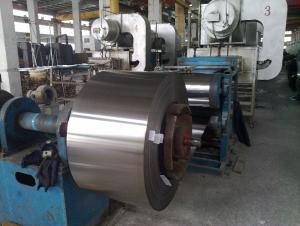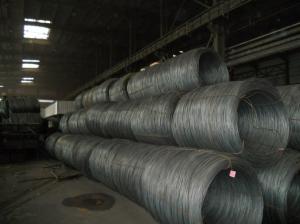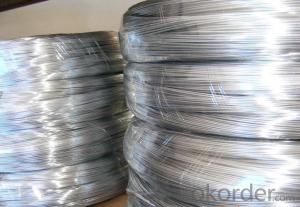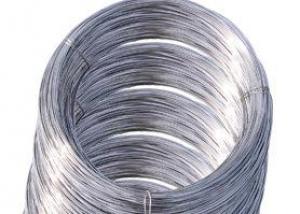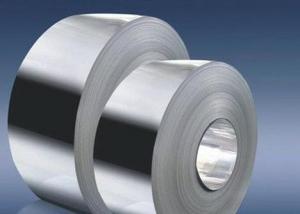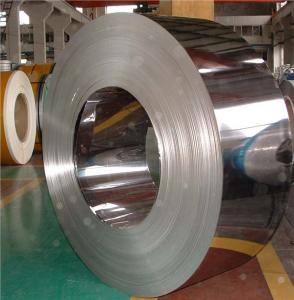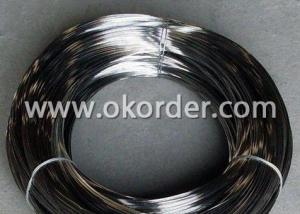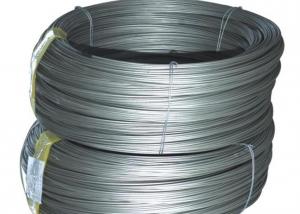430 Stainless Steel Strips
- Loading Port:
- China Main Port
- Payment Terms:
- TT or LC
- Min Order Qty:
- 1 Ton m.t.
- Supply Capability:
- 2000 Tons Per Month m.t./month
OKorder Service Pledge
OKorder Financial Service
You Might Also Like
430 Stainless Steel Strips
1. Chemical composition
|
C |
Si |
Mn |
P |
S |
Ni |
Cr |
|
max0.12 |
max1.00 |
max1.00 |
max0.04 |
max0.03 |
--- |
16.00-18.00 |
2. Mechanical properties
|
Yield Strength |
Tensile |
Elongation |
Hardness (HV) |
Hardness (HRB) |
|
≥205 |
≥420 |
≥22 |
≤200 |
≤88 |
3. Standard: AISI, ASTM, GB, EN, DIN, JIS
4. Surface: 2B, NO.1, BA, NO.4, Hairline, SB, Mirror finish, Anti-skid, Cherkered etc.
5. Size: Thickness: 0.3-3mm (cold rolled), 3-40mm (hot rolled)
Width: 18-600mm.
Length: As customers' request.
6. MOQ: 1 Ton
7. Payment terms: T/T or L/C
8. Packing: Seaworthy package with wooden or Iron pallets with the paper and the steel strip, or as customers' request.
9. Delivery time: Usually about 7 days after we confirming the order, or according to your quantity.
If you have any question or demand, pls feel free to contact me.
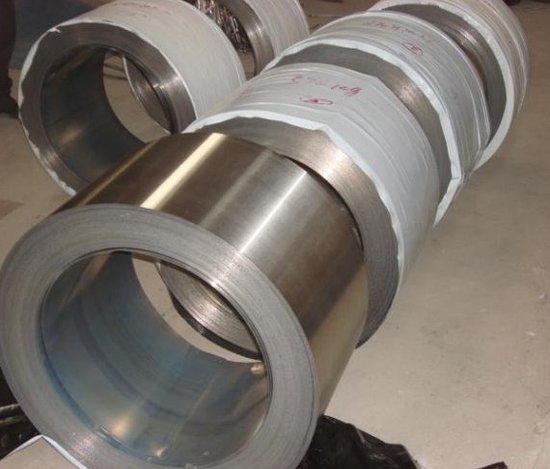
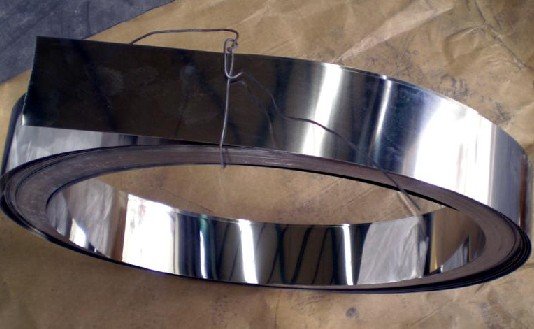

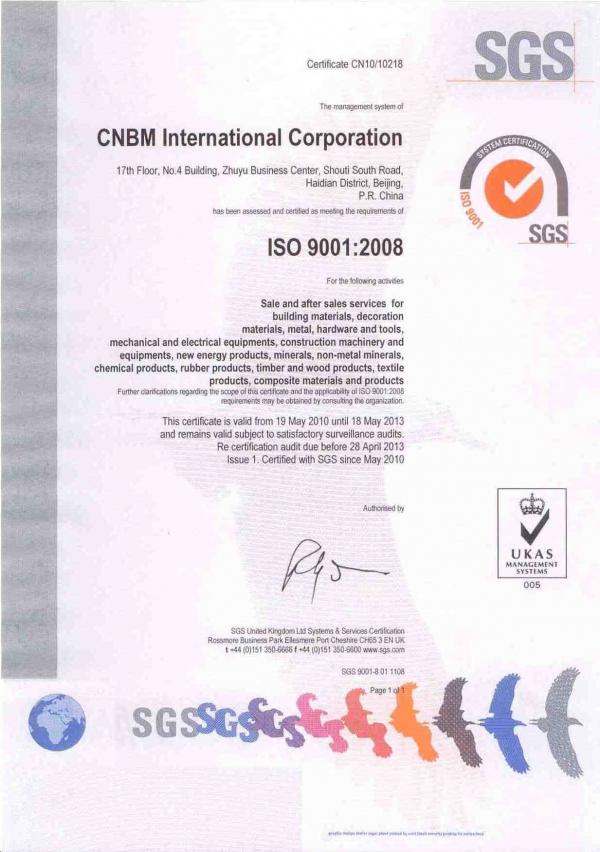
- Q:Is stainless steel wire suitable for wire rope fences?
- Yes, stainless steel wire is suitable for wire rope fences. Stainless steel is a highly durable and corrosion-resistant material, making it ideal for outdoor applications such as fences. It can withstand harsh weather conditions, including rain, snow, and UV rays, without rusting or corroding. Additionally, stainless steel wire has high tensile strength, which ensures that the fence can withstand tension and pressure. This makes it a reliable and long-lasting choice for wire rope fences, providing security and stability for a wide range of applications, including residential, commercial, and industrial settings.
- Q:Can stainless steel wire be used for fishing line?
- No, stainless steel wire is not commonly used for fishing line. While it is true that stainless steel wire is incredibly strong and resistant to corrosion, it is not suitable for fishing because it lacks the necessary properties for effective fishing line. Stainless steel wire is much thicker and heavier than traditional fishing line, making it difficult to cast and manipulate in water. Additionally, stainless steel wire lacks the necessary flexibility and stretch that fishing line requires to absorb the shock of a fish biting or fighting against the line. For these reasons, specialized fishing lines made from materials like nylon or fluorocarbon are preferred for fishing purposes.
- Q:What are the different wire diameter measurement methods for stainless steel wire?
- There are several different wire diameter measurement methods that can be used for stainless steel wire. These methods include: 1. Micrometer: This is a commonly used tool for measuring the diameter of wires. It consists of a calibrated screw and a scale, allowing for precise measurements of the wire diameter. 2. Optical measurement: This method involves using a microscope or digital camera to capture an image of the wire. Software is then used to analyze the image and measure the diameter of the wire. 3. Laser measurement: Laser measurement devices use laser beams to measure the diameter of the wire. These devices can provide accurate and non-contact measurements, making them suitable for measuring thin wires. 4. Wire gauge: Wire gauges are cylindrical tools with various diameters marked on them. The wire is passed through the appropriate hole in the gauge, and the diameter of the wire can be determined by the size of the hole it fits through. 5. Wire drawing measurement: This method involves passing the wire through a series of progressively smaller dies to reduce its diameter. The diameter of the wire can then be measured by the size of the die used. Each of these methods has its own advantages and limitations, depending on factors such as wire thickness, accuracy requirements, and the availability of equipment. It is important to choose the most appropriate method based on these factors to ensure accurate and reliable measurements of stainless steel wire diameter.
- Q:Can stainless steel wire be used for fishing nets?
- Yes, stainless steel wire can be used for fishing nets. Stainless steel is a durable and corrosion-resistant material, making it suitable for use in marine environments where fishing nets are commonly used. The strength of stainless steel wire allows it to withstand the tension and pressure exerted by the fish caught in the net. Additionally, stainless steel is less prone to rusting or deteriorating compared to other materials, ensuring the longevity and reliability of the fishing net.
- Q:Can stainless steel wire be used for wire screens?
- Yes, stainless steel wire can be used for wire screens. Stainless steel wire is commonly used for making wire screens due to its corrosion resistance, durability, and strength. It is ideal for applications that require resistance to rust and corrosion, making it suitable for use in outdoor environments or in industries where exposure to moisture, chemicals, or high temperatures is common. Stainless steel wire screens are commonly used in various industries such as mining, agriculture, construction, and food processing, where they are used for filtering, separating, or protecting materials.
- Q:Is stainless steel wire suitable for wire rope slings?
- Yes, stainless steel wire is suitable for wire rope slings. Stainless steel is highly resistant to corrosion and has excellent strength and durability, making it an ideal choice for applications where wire rope slings may be exposed to harsh environments or chemicals. Additionally, stainless steel wire rope slings offer good flexibility, allowing them to be easily maneuvered and used for various lifting and rigging purposes.
- Q:What are the different types of stainless steel wire ties?
- There are several types of stainless steel wire ties, including standard stainless steel wire ties, coated stainless steel wire ties, self-locking stainless steel wire ties, and stainless steel cable ties with insulation.
- Q:Can stainless steel wire be used for surgical instruments?
- Yes, stainless steel wire can be used for surgical instruments. Stainless steel is a popular choice for surgical instruments due to its durability, corrosion resistance, and ability to withstand repeated sterilization. It is commonly used for making surgical needles, sutures, and various other instruments used in surgical procedures.
- Q:How does the diameter of stainless steel wire affect its strength?
- The diameter of stainless steel wire has a direct impact on its strength. Generally, as the diameter of the wire increases, its strength also increases. This is due to the increased cross-sectional area of the wire, which allows for a greater distribution of load and resistance to deformation or breaking. When the diameter of the stainless steel wire is larger, it can withstand higher levels of tension or compression without experiencing failure. This makes it suitable for applications that require greater strength, such as in construction, engineering, or manufacturing industries. On the other hand, if the diameter of the stainless steel wire is smaller, its strength decreases. Thinner wires have a smaller cross-sectional area, which means they have less material to distribute the load and are more prone to deformation or breaking under stress. However, thinner wires may be preferred for applications that require flexibility or where a lower tensile strength is sufficient. It is important to note that the specific grade or alloy of stainless steel wire also affects its strength. Different alloys have varying mechanical properties, including strength, so it is crucial to consider the specific requirements of the application when selecting the appropriate wire diameter and material.
- Q:Can stainless steel wire withstand high temperatures?
- Yes, stainless steel wire is known for its ability to withstand high temperatures. Stainless steel is a highly heat-resistant material, which makes stainless steel wire suitable for use in high-temperature environments. It has a high melting point and excellent resistance to oxidation and corrosion, allowing it to maintain its strength and integrity even under extreme heat conditions. This makes stainless steel wire a popular choice in various industries such as aerospace, automotive, and industrial applications where high temperatures are encountered.
1. Manufacturer Overview |
|
|---|---|
| Location | Shandong,China |
| Year Established | 2005 |
| Annual Output Value | Above US$5.3 Million |
| Main Markets | Europe, China |
| Company Certifications | ISO9001:2000 |
2. Manufacturer Certificates |
|
|---|---|
| a) Certification Name | |
| Range | |
| Reference | |
| Validity Period | |
3. Manufacturer Capability |
|
|---|---|
| a)Trade Capacity | |
| Nearest Port | Tian Jin |
| Export Percentage | 30% |
| No.of Employees in Trade Department | 40 People |
| Language Spoken: | English;Chinese |
| b)Factory Information | |
| Factory Size: | Above 50,000 square meters |
| No. of Production Lines | Above 8 |
| Contract Manufacturing | OEM Service Offered;Design Service Offered |
| Product Price Range | Average |
Send your message to us
430 Stainless Steel Strips
- Loading Port:
- China Main Port
- Payment Terms:
- TT or LC
- Min Order Qty:
- 1 Ton m.t.
- Supply Capability:
- 2000 Tons Per Month m.t./month
OKorder Service Pledge
OKorder Financial Service
Similar products
New products
Hot products
Hot Searches
Related keywords
